Topics
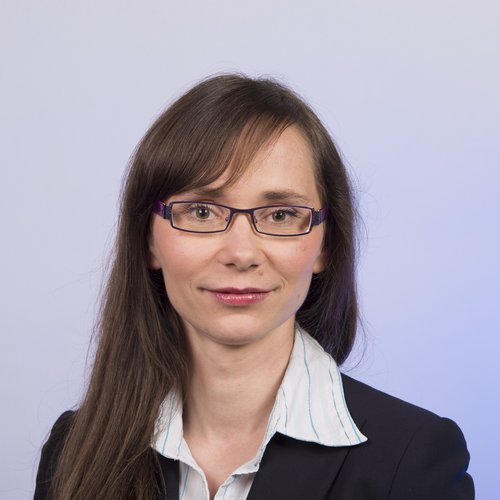
Dr. Sandra Vogel
Senior Researcher for Industrial Relations
Tel: +49 221 4981-746 Mail: sandra.vogel@iwkoeln.de @San_Vogel- Since 2006 at the IW
- Studies and subsequent doctorate in Modern China Studies at the University of Cologne and Zhejiang University in Hangzhou (PR China)
- current main topics: Industrial Relations, Collective Bargaining and Collective Bargaining Autonomy, AVE.
- Supervises the research work for the European Foundation for the Improvement of Living and Working Conditions (Eurofound), which is carried out jointly with the WSI for Germany.
- Member of the Research Unit on Collective Bargaining Autonomy
Research unit
IW Publications
Bach, Helena / Fulda, Carolin Denise / Vogel, Sandra, 2024, Das Für und Wider einer Gewerkschaftsmitgliedschaft, in: IW-Trends, 51. Jg., Nr. 1, S. 117–138
Zur Studie
Lesch, Hagen / Bach, Helena / Vogel, Sandra, 2023, Tarifautonomie in der Legitimitätskrise? Eine Analyse historischer Daten, IW-Policy Paper, Nr. 11, Köln
Zur Studie
Fulda, Carolin Denise / Lesch, Hagen / Schröder, Christoph / Vogel, Sandra, 2023, Einflüsse des Mindestlohns auf das Tarifgeschehen. Ergebnisse ausgewählter Niedriglohnbranchen, IW-Analyse, Nr. 154, Berlin / Köln
Zur Studie
Bach, Helena / Lesch, Hagen / Vogel, Sandra, 2022, Die Legitimität der Tarifautonomie in Deutschland. Wirtschaftspolitische Lehren aus historischen Debatten von 1918 bis heute, IW-Analyse, Nr. 148, Köln
Zur Studie
Schneider, Helena / Stettes, Oliver / Vogel, Sandra, 2019, Betriebliche Arbeitsbeziehungen und Transformationsprozesse. Eine empirische Analyse auf Basis des IW-Personalpanels, in: IW-Trends, 2019, Nr. 3
Zur Studie
Die Allgemeinverbindlicherklärung im Tarifvertragssystem – Wirkung und Bedeutung der Reform von 2014
IW-Analysen – Forschungsberichte Nr. 128, Köln 2019
(in cooperation with Hagen Lesch, Helena Schneider)
Einstellung zur Tarifbindung in der Metall- und Elektro-Industrie – Ergebnisse einer Unternehmensbefragung
IW-Trends 1/2019
(in cooperation with Helena Schneider)
Tarifbindung der Beschäftigten in Deutschland – Eine Auswertung des Sozioökonomischen Panels
IW-Report 15/2018
(in cooperation with Hagen Lesch, Hannah Busshoff, Adam Giza)
Stärkung der Tarifbindung
IW-Analysen – Forschungsberichte Nr. 120, Köln 2017
(in cooperation with Wido Geis)
Erfolgsmodell mit Verbesserungspotenzial
IW-Kurzbericht 41/2016
(in cooperation with Wido Geis, Jeannette Michaelle Nintcheu)
Fachkräfte für Deutschland – Potenziale einer gesteuerten Zuwanderung
IW-Analysen – Forschungsberichte Nr. 105, Köln 2016
Expertises
(in cooperation with Marc Breitenbroich)
Annual review of working life, Cologne
Gutachten für die Europäische Stiftung zur Verbesserung der Lebens- und Arbeitsbedingungen (Eurofound), 2019
(in cooperation with Marc Breitenbroich)
Recent initiatives on work-life balance in the context working time flexibility and ICT use, Cologne
Gutachten für die Europäische Stiftung zur Verbesserung der Lebens- und Arbeitsbedingungen (Eurofound), 2019
(in cooperation with Marc Breitenbroich)
The impact of digitalisation on social services in Germany
Gutachten für die Europäische Stiftung zur Verbesserung der Lebens- und Arbeitsbedingungen (Eurofound), 2018
Low wage labour and social security
Gutachten für Oxford Research Finland, 2018
(in cooperation with Paula Hellmich, Hagen Lesch, Helena Schneider, Christopher Schröder)
Statistische Eckdaten: Einflussfaktoren Tarifbindung (1918-2017), Köln
Gutachten für Gesamtmetall, 2018
(in cooperation with Marc Breitenbroich)
Topical update on seniority based entitlements in Germany
Gutachten für die Europäische Stiftung zur Verbesserung der Lebens- und Arbeitsbedingungen (Eurofound), 2018
(in cooperation with Marc Breitenbroich)
Provision of out of school care in Germany
Gutachten für die Europäische Stiftung zur Verbesserung der Lebens- und Arbeitsbedingungen (Eurofound), 2018
(in cooperation with Birgit Kraemer)
The representativeness of trade unions and employer organisations in the Industrial Cleaning sector in Germany
Gutachten für die Europäische Stiftung zur Verbesserung der Lebens- und Arbeitsbedingungen (Eurofound), 2018
(in cooperation with Birgit Kraemer)
social dialogue practices involving social partners
Gutachten für die Europäische Stiftung zur Verbesserung der Lebens- und Arbeitsbedingungen (Eurofound), 2018
(in cooperation with Hagen Lesch, Paula Hellmich)
The State and social partners working together: Germany’s response to the global financial and economic crisis
Gutachten für International Labour Office, 2017
(in cooperation with Hagen Lesch)
Working together – State intervention and social partner involvement. Germany’s response to the global and financial crisis
Report for the International Labour Office (ILO) and European Commission (EC), 2016
Reactivate. Return to work of long-term excluded
Beitrag zum Online Observatory EurWORK, 2016
(in cooperation with Birgit Kraemer)
Involvement of the social parterns in the EU semester
Beitrag zum Online Observatory EurWORK, 2016
(in cooperation with Birgit Kraemer)
Germany – The representativeness of trade unions and employer organisations in the hairdressing and other beauty treatment sector
Expertise, 2016
Exploring Self-Employment in Europe
Expertise, 2016
Europe Refugee Crisis - Evidence on approaches to labour market integration of refugees
Expertise, 2016
Germany – Social partner and research perspectives on digitalisation
Expertise, 2016
(in cooperation with Birgit Kraemer)
Germany – Debates and first steps by social partners towards labour market integration of refugees
Expertise, 2016
(in cooperation with Birgit Kraemer)
Germany – Occupational health strategy focuses on work-related stress
Expertise, 2016
Germany – Survey on works council elections in 1,600 companies
Expertise, 2015
Germany – Fewer fatal work accidents in 2013
Expertise, 2015
Germany – New alliance for vocational training and further employment
Expertise, 2015
Germany – Working conditions in apprenticeships
Expertise, 2015
Germany – New retirement package
Expertise, 2015
Germany – Occupational choices of youths remain unchanged
Expertise 2014
Young people and temporary employment in Europe – The case of Germany
Beitrag aus dem Institut der deutschen Wirtschaft Köln zum European Working Conditions Observatory (EWCO), Dezember 2013
Impact of the crisis on working conditions – The case of Germany
Beitrag aus dem Institut der deutschen Wirtschaft Köln zum European Working Conditions Observatory (EWCO), Juli 2013
Impact of the crisis on industrial relations – The case of Germany
Beitrag aus dem Institut der deutschen Wirtschaft Köln zum European Working Conditions Observatory (EWCO), Juni 2013
Social partners involvement in unemployment benefit regimes - The case of Germany
Beitrag aus dem Institut der deutschen Wirtschaft Köln zum European Working Conditions Observatory (EWCO), Dezember 2012
Changing Business Landscape in the Electricity sector and Industrial Relations in Europe - The case of Germany
Beitrag aus dem Institut der deutschen Wirtschaft Köln zum European Working Conditions Observatory (EWCO), November 2012
Recent Policy Development related to those Not in Employment, Education and Training (NEET)
Beitrag aus dem Institut der deutschen Wirtschaft Köln zum European Working Conditions Observatory (EWCO), Februar 2012
SMEs in the crisis: Employment, Industrial Relations and local partnership
Beitrag aus dem Institut der deutschen Wirtschaft Köln zum European Working Conditions Observatory (EWCO), Januar 2012
Working conditions of nationals with a foreign background
Beitrag aus dem Institut der deutschen Wirtschaft Köln zum European Working Conditions Observatory (EWCO), Juli 2011
Getting prepared for the upswing: Training and Quialification during the Crisis
Beitrag aus dem Institut der deutschen Wirtschaft Köln zum European Working Conditions Observatory (EWCO), März 2011
Emerging forms of entrepreneurship - The case of Germany
Beitrag aus dem Institut der deutschen Wirtschaft Köln zum European Working Conditions Observatory (EWCO), März 2011
SMEs in the crisis – Employment, Industrial Relations and local partnership
Beitrag aus dem Institut der deutschen Wirtschaft Köln zum European Working Conditions Observatory (EWCO), Januar 2011
Working time in the European Union
Beitrag aus dem Institut der deutschen Wirtschaft Köln zum European Working Conditions Observatory (EWCO), 4/2010
Developments in social partner organisations: employer organisations
Beitrag aus dem Institut der deutschen Wirtschaft Köln zum European Working Conditions Observatory (EWCO), 3/2010
Quality of employment of low-qualified workers
Beitrag aus dem Institut der deutschen Wirtschaft Köln zum European Working Conditions Observatory (EWCO), 6/2009
Working time in the European Union
Beitrag aus dem Institut der deutschen Wirtschaft Köln zum European Working Conditions Observatory (EWCO), 5/2009
Occupational Promotion of Migrant Workers – The case of Germany
Beitrag aus dem Institut der deutschen Wirtschaft Köln zum European Working Conditions Observatory (EWCO), 4/2009
(in cooperation with Heiner Dribbusch)
Self-employed Workers – Industrial Relations and Working Conditions
Beitrag aus dem Institut der deutschen Wirtschaft Köln zum European Working Conditions Observatory (EWCO), 3/2009
The situation of migrant workers – The case of Germany
Beitrag aus dem Institut der deutschen Wirtschaft Köln zum European Working Conditions Observatory (EWCO), 4/2007
Gender and Career Development – The case of Germany
Beitrag aus dem Institut der deutschen Wirtschaft Köln zum European Working Conditions Observatory (EWCO), 3/2007
External Publications
(in cooperation with Hagen Lesch, Helena Schneider)
Rückzug aus der Flächentarifbindung: Empirischer Forschungsstand und Implikationen für eine Stabilisierung des Tarifsystems
Sozialer Fortschritt, 67. Jg., Nr. 10, 2018, S. 867–886
(in cooperation with Hagen Lesch)
Working together: Germany’s response to the global financial and economic crisis
ILO (Ed.): Post-crisis social dialogue: Good practices in the EU 28
(in cooperation with Birgit Krämer)
Germany: Representativeness of the European social partner organisations in the cross-industry social dialogue
Analytical Report für das European Industrial Relations Observatory, 2014
Germany: Representativeness of the European social partner organisations in the electricity sector
EIROnline
Germany: Young people and temporary employment in Europe
European Restructuring Monitor Online
Germany: Final Questionnaire EWCO car on impact of the crisis on working conditions
Analytical Report 2013-07-05 für das European Working Conditions Observatory
(in cooperation with Birgit Krämer)
Germany: The representativeness of trade unions and employer associations in the sport and active leisure sector
Analytical Report 2013-06-14 für das European Industrial Relations Observatory
Germany: Impact of the crisis on industrial relations
Analytical Report 2013-06-18 für das European Industrial Relations Observatory
(in cooperation with Birgit Krämer)
Germany: The representativeness of trade unions and employer associations in the textile and clothing sector
Analytical Report 2013-07-25 für das European Industrial Relations Observatory
(in cooperation with Birgit Krämer)
Germany: The representativeness of trade unions and employer associations in the audiovisual sector
Analytical Report 2012-04-18 für das European Industrial Relations Observatory
(in cooperation with Birgit Krämer)
Germany: The representativeness of trade unions and employer associations in the food and drink sector
Analytical Report 2012-05-09 für das European Industrial Relations Observatory
(in cooperation with Birgit Krämer)
Germany: The representativeness of trade unions and employer associations in the live performance sector
Analytical Report 2012-05-20 für das European Industrial Relations Observatory
Germany: Social partners involvement in unemployment benefit regimes
Analytical Report 2012-12-21 für das European Industrial Relations Observatory
(in cooperation with Birgit Krämer)
Germany: The representativeness of trade unions and employer associations in the HORECA sector
Information Update 2012-10-23 für das European Industrial Relations Observatory
(in cooperation with Birgit Krämer)
Germany: The representativeness of trade unions and employer associations in the cleaning activities sector
Information Update 2012-09-24 für das European Industrial Relations Observatory
(in cooperation with Birgit Beese)
The representativeness of trade unions and employer organisations in the private security sector
Beiträge des IW 2012-06-28 für das European Industrial Relations Observatory
(in cooperation with Birgit Krämer)
Germany: The representativeness of trade unions and employer associations in the sea fisheries sector
Beiträge des IW 2012-03-07 für European Industrial Relations Observatory
(in cooperation with Birgit Krämer)
Germany: The representativeness of trade unions and employer associations in the paper sector
Beiträge des IW 2012-03-27 für European Industrial Relations Observatory
(in cooperation with Heiner Dribbusch)
Germany: The representativeness of trade unions and employer associations in the insurance sector
Beiträge des IW 2012-04-23 für European Industrial Relations Observatory
Comperative analytical report (ERM) on recent policy development related to those not in employment, education and training (NEET)
Beiträge des IW 2012-02-07 für European Restructuring Monitor
(in cooperation with Birgit Krämer)
Germany: The representativeness of trade unions and employer organisations in the banking sector
Beiträge des IW 2011-08-01 für European Industrial Relations Observatory
Germany: EWCO CAR Working condition of national with a foreign background
Beiträge des IW 2011-07-28 für European Working Conditions Observatory
(in cooperation with Birgit Krämer)
Germany: The representativeness of trade unions and employer organisations in the commerce sector
Beiträge des IW für das European Industrial Relations Observatory, 2011
(in cooperation with Birgit Krämer)
Germany: Representativeness study of the European social partner organisations - Public administration
Beiträge des IW für das European Industrial Relations Observatory, 2011
Germany: EIRO CAR on SMEs in the crisis: Employment, Industrial Relations and Local Partnership
Beiträge des IW für das European Industrial Relations Observatory, 2011
EWCO CAR on Getting prepared for the upswing: Training and qualification during the crisis
Beiträge des IW 2011-03-01 für European Working Conditions Observatory
ERM comparative analytical report on emerging forms of entrepreneurship
Beiträge des IW 2011-03-22 zum European Restructuring Monitor
More from Dr. Sandra Vogel
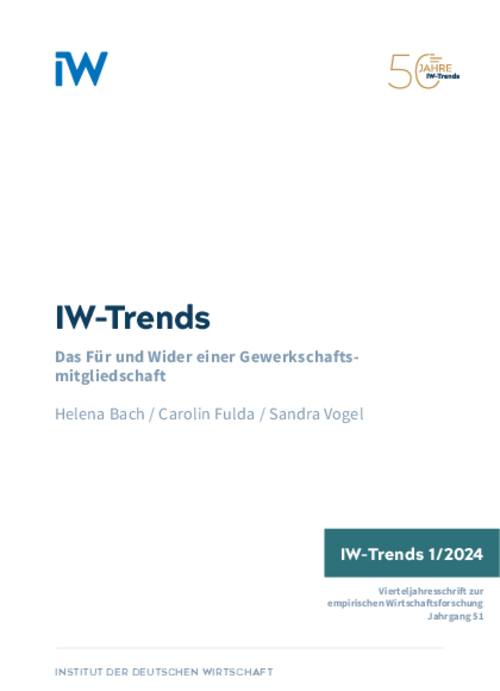
The Pros and Cons of Trade Union Membership
The decline in collective bargaining coverage in Germany is often attributed to the reluctance of companies to join an employers' association which negotiates collective agreements.
IW
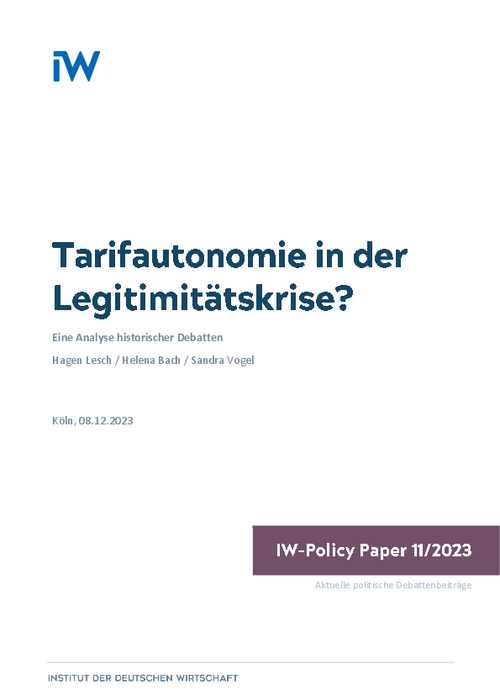
Collective bargaining autonomy in a crisis of legitimacy?
In Germany, the employers recognised the trade unions as the appointed representatives of the employees in November 1918.
IW
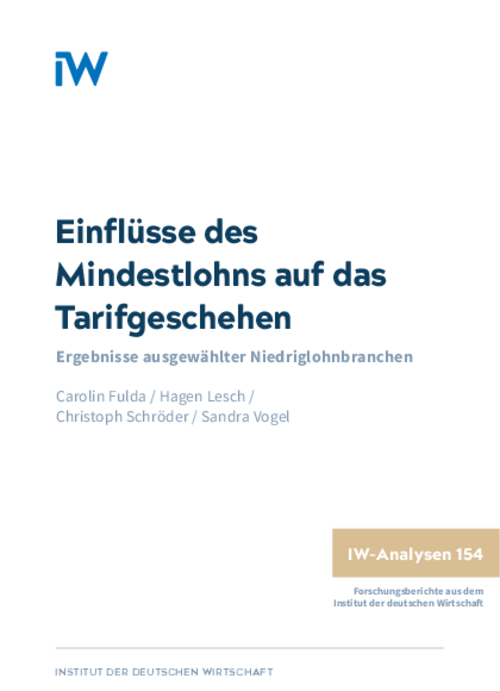
The Influence of the Minimum Wage on Collective Bargaining
This analysis examines the connection between collective wage bargaining in Germany and the adjustments to the statutory minimum wage determined by the Minimum Wage Commission since June 2020.
IW
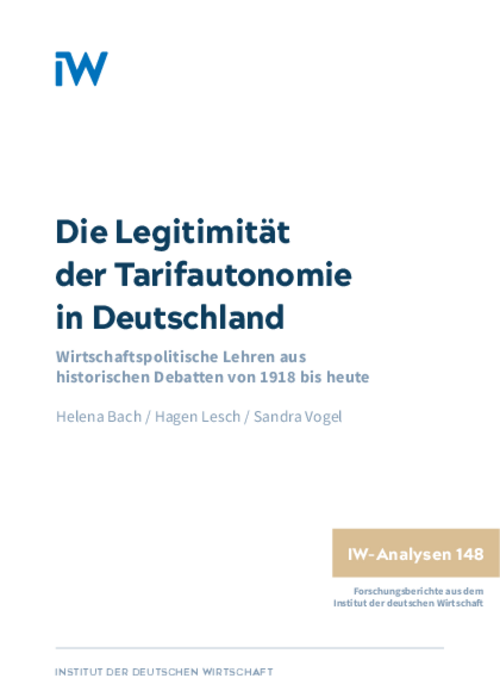
The Legitimacy of Free Collective Bargaining in Germany
Since the signing of the Stinnes-Legien Agreement in 1918, the collective bargaining autonomy of Germany’s employers’ associations and trade unions has been the subject of continual political debate and at times its legitimacy even called into question.
IW
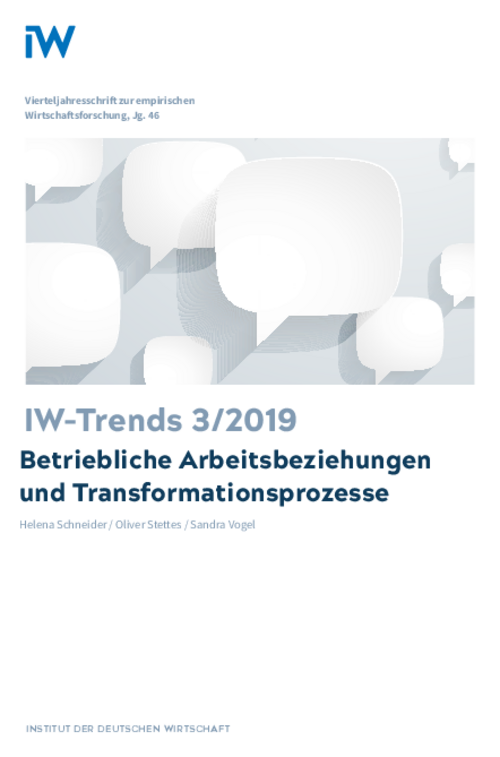
Industrial Relations and Transformation Processes
As digitalisation of the economy and society as a whole progresses, fears have been expressed that this rapid and sometimes disruptive technological change might prevent works councils from adequately representing employees and their concerns to management.
IW

Results of a Company Survey: Attitudes Towards Binding Collective Bargaining in the Metal and Electrical Industry
A survey of 1,553 companies in the metal and electrical industry about their attitude to binding collective bargaining shows that two thirds of these firms are satisfied with their binding sector-level agreements.
IW
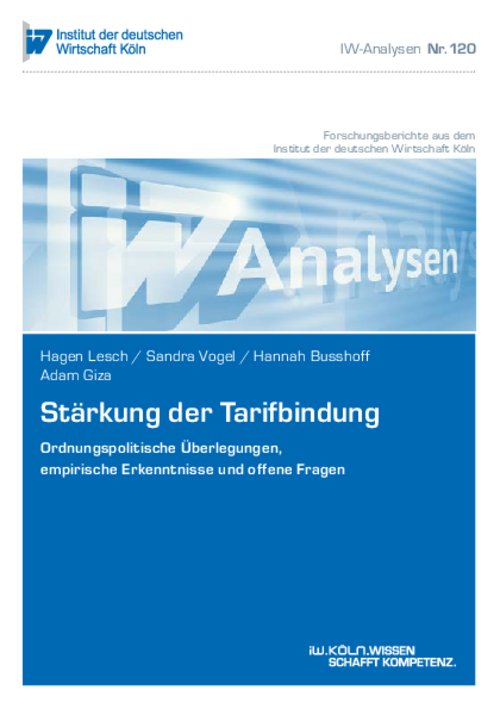
Expanding collective bargaining coverage
Declining collective bargaining coverage in Germany has prompted a debate on how the trend could be reversed. However, this debate makes no distinction between the coverage and the autonomy of collective bargaining.
IW
The state and social partners working together: Germany's response to the global financial and economic crisis
This paper is one of a series of studies commissioned by the International Labour Office. It examines the role of social dialogue and collective bargaining in facilitating the so-called “jobs miracle” in Germany, which saw a drop in unemployment during the peak years of the economic and financial crisis.
IW
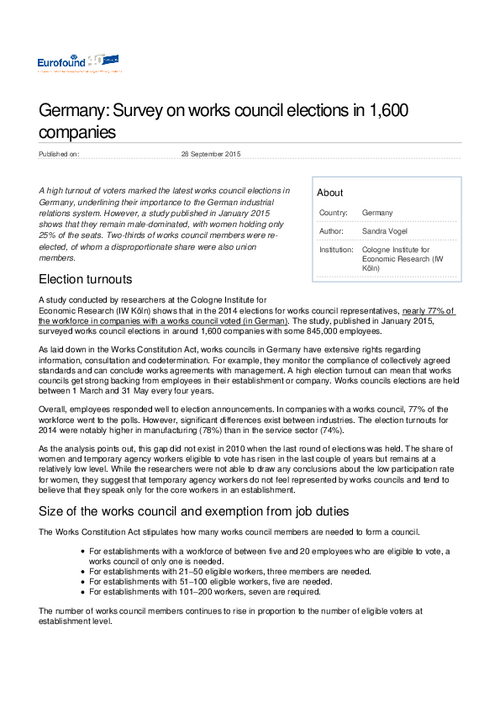
Germany: Survey on works council elections in 1,600 companies
A high turnout of voters marked the latest works council elections in Germany, underlining their importance to the German industrial relations system. However, a study published in January 2015 shows that they remain male-dominated, with women holding only 25% of the seats. Two-thirds of works council members were reelected, of whom a disproportionate share were also union members.
IW
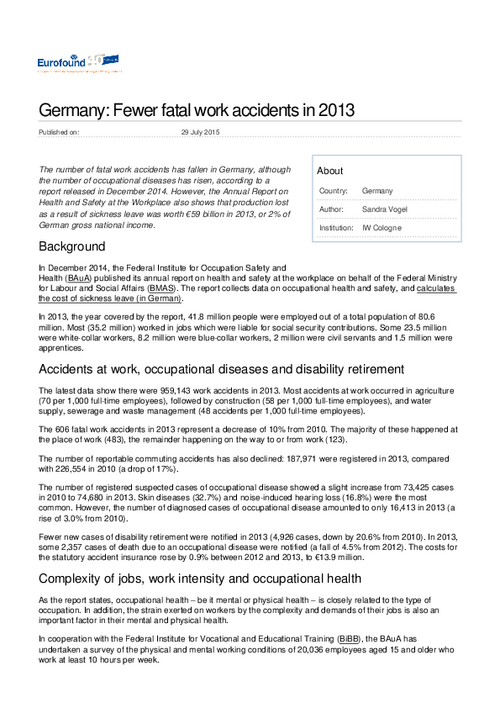
Germany: Fewer fatal work accidents in 2013
The number of fatal work accidents has fallen in Germany, although the number of occupational diseases has risen, according to a report released in December 2014. However, the Annual Report on Health and Safety at the Workplace also shows that production lost as a result of sickness leave was worth €59 billion in 2013, or 2% of German gross national income.
IW